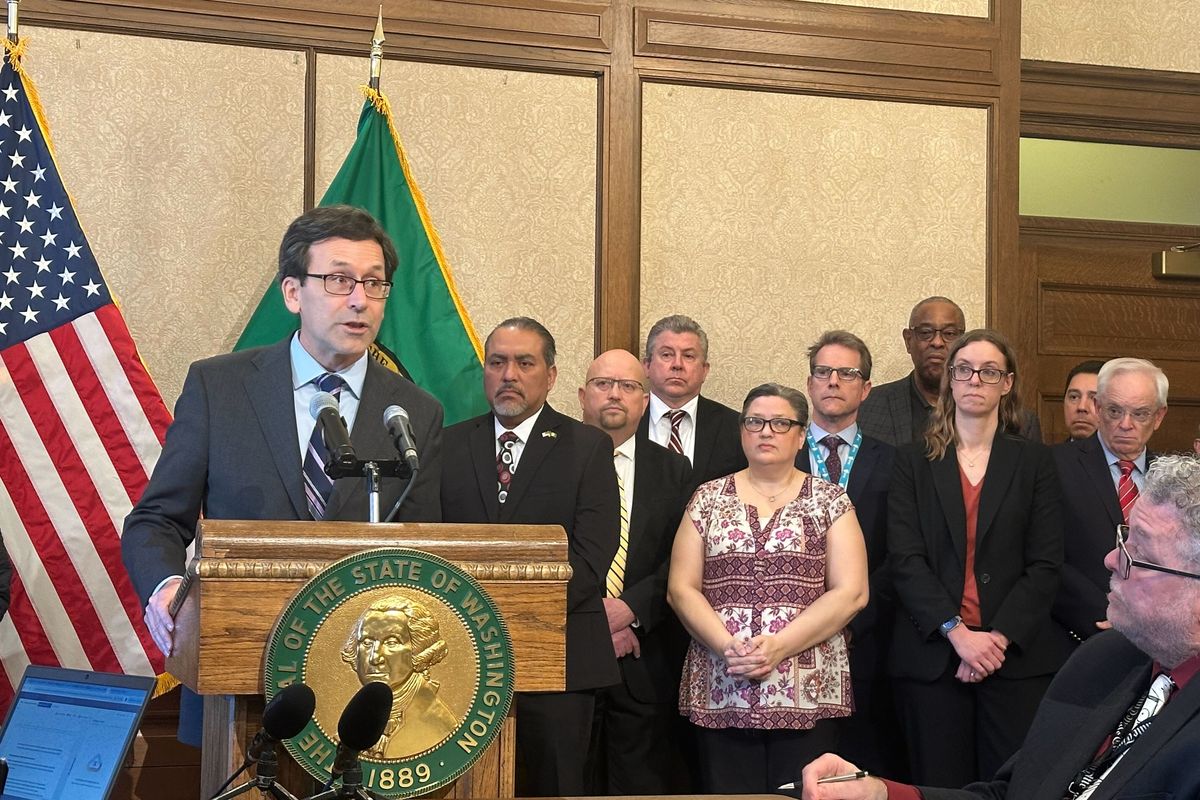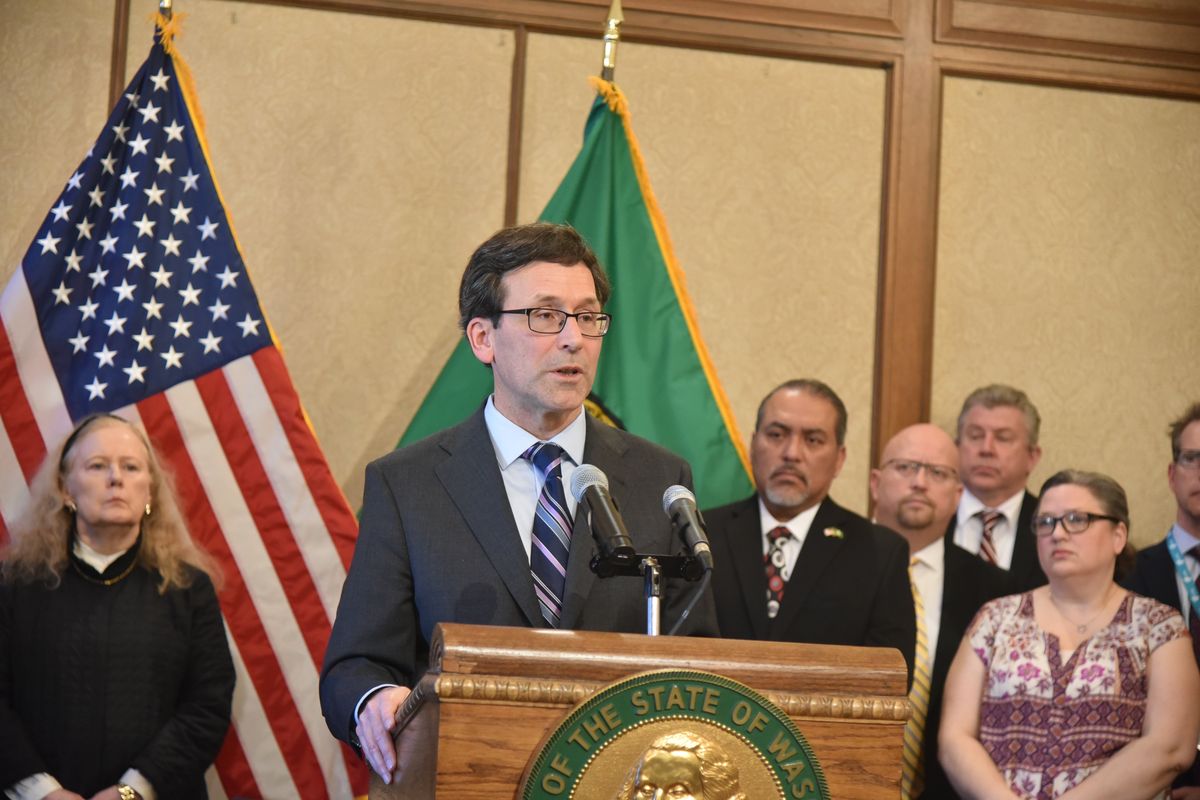Ferguson unveils budget cuts plan as lawmakers look to address deficit
Gov. Bob Ferguson discusses his plans for budget cuts at a news conference on Thursday. (Mitchell Roland/The Spokesman-Review)
OLYMPIA – Gov. Bob Ferguson unveiled a plan Thursday to save Washington $4 billion over the next four years to address a budget deficit the governor projects to be $15 billion over that span.
He announced the plan amidst what Ferguson described as a “budget crisis” and as he called on the state government to “do a better job of budgeting within our means.”
“I’ve said this many times: I do not plan on doing this every two years,” Ferguson said. “I also want to emphasize that I understand, that we understand, the decisions that I make, that we make, impact people’s lives. And we do not take that lightly.”
While many of the suggestions still need legislative approval, Ferguson called on most state agencies to cut their budgets by 6%, though public safety and K-12 education were exempt from the cuts.
The $15 billion budget deficit cited by Ferguson is also an uptick from what has been previously estimated. In December, the Office of Financial Management projected the deficit at approximately $12.6 billion over the next four years, while Republican lawmakers this week pegged the number closer to $6 billion.
“I’ve seen different numbers; this is what my team has advised. We get that it’s fluid; it depends on how you calculate it,” Ferguson said. “We think $15 billion is the number, I think the Legislature is largely using that as well. And that’s the number that we’ve worked off of.”
The savings unveiled Thursday come on top of cuts previously proposed by Gov. Jay Inslee to shave off an additional $3 billion. Ferguson said the heads of agencies have identified another billion dollars in potential cuts that he is not ready to recommend, though he will forward the suggestions to the Legislature for consideration.
“Including the proposal from Gov. Inslee in his proposed budget, we are approximately halfway toward closing the approximately $15 billion budget shortfall,” Ferguson said. “Another way to think about it, we are approximately 43% of the way through the session and nearly 50% of the way toward solving the shortfall. So we’re on schedule, but we have a lot more work to do.”
Ferguson’s plan includes furloughing most state employees once a month for the next two years, which the governor said would save more than $300 million. Certain employees would be exempt from the furloughs, including state patrol, prison staff and those at state hospitals.
“I believe this is necessary to preserve the funding for the compensation increases they earned and negotiated,” Ferguson said. “I continue to support full funding for the collective bargaining increases. Furloughs, of course, reduce compensation without reducing salaries, so that employees return to the compensation levels they have earned and bargained once we get through this budget crisis.”
According to staff from the Office of Financial Management, Ferguson also proposed eliminating approximately 1,000 full-time-equivalent state government positions, which includes eliminating open positions, attrition and, in some instances, eliminating current positions. The governor’s office noted this figure does not equal the number of eliminated jobs.
Since taking office, Ferguson has repeatedly called on state officials to scrub the budget before discussions turn to potentially adopting new tax streams to fund government services. On Thursday, Ferguson was not ready to discuss the potential for new revenue.
“It’s too soon to say right now,” Ferguson said. “Our energy’s been focused entirely on this process, which has been time-consuming, and a lot of decisions being made to get to that $4 billion figure, to put it mildly. And so that’s been my focus.”
Ferguson added that the state is “not going to tax our way out of this thing; not going to happen.”
The cuts, the Governor’s Office said, were based on four principles, including reducing redundancy and ensuring efficiencies, examining proposed or adopted spending that has not yet been implemented, rolling back recently approved spending and reviewing programs and services that were previously funded through one-time federal COVID funds that are now financed through state resources.
“Many of these reductions we should be making, even if we we’re not facing a budget shortfall,” Ferguson said.
Ferguson’s plan maintains investments in K-12 education and adopts Inslee’s proposed investments in public education. According to the governor’s office, his plan would also increase the percentage of funds devoted to K-12 education.
Ferguson called on colleges and universities in the state to propose 3% cuts.
According to the plan released by the governor, Washington State University would achieve this by reducing funding for the Native American Scholarship program and targeted reductions in the general fund. The plan does not call on WSU to reduce the number of slots for undergraduate students or reduce the amount of financial aid to students.
At Eastern Washington University, the governor’s plan suggests the school reduce compensation and central services support and reduce funding for goods and services.
The plan would maintain investments to address homelessness and housing assistance, as well as cash benefit assistance programs like the Temporary Assistance for Needy Families.
Ferguson said his plan also maintains Medicaid eligibility for Washington residents.
“To put it another way, if you are a Washingtonian on Medicaid, you will not lose your state coverage,” Ferguson said.
Ferguson said his goal was to identify redundant or otherwise unnecessary expenses that would not impact the direct services that residents receive.
Ferguson said the state plans to cancel the lease for a warehouse operated by the Department of Health that was previously used to store COVID-19 supplies. The closure, Ferguson’s office said, would save approximately $4.4 million over four years.
Ferguson said the state could save approximately $90 million by closing unused wards at Western State Hospital, a psychiatric hospital located in Lakewood that’s operated by the Department of Social and Health Services. It would be a “warm closure,” meaning the space could be used at a later date if needed.
Ferguson also called on the Department of Social and Health Services to save nearly $4 million to close a 24-bed ward at the state’s Special Commitment Center that houses sex offenders on McNeil Island in the Puget Sound. The facility had a declining population, Ferguson said.
Under the governor’s plan, travel for state employees would be reduced , including a 50% decline in out-of-state travel, a 25% reduction in in-state travel, and a 10% cut in state agency spending on equipment and other services.
The potential for new spending this session appears uncertain, including a plan to expand access to free school meals to all students. Ahead of a Friday deadline for the proposal to advance in the House of Representatives, Democratic leadership said this week that the legislation was unlikely to pass this session.
Ferguson said Thursday that lawmakers could look to phase in an expansion of the program in the coming years.
“We’re still pursuing what options we have to help families get the benefit of their kids getting lunches and breakfasts,” Ferguson said. “So, we’re not ruling that one out, but again, we have a lot of time still ahead in the session.”
Ferguson said Thursday that the proposals do not represent final decisions and should be viewed as recommendations for the Legislature to consider.
“We were mindful that a number of these do require legislative action,” Ferguson said.
Budget leaders from both sides of the aisle said Thursday that they were receptive to many of the governor’s proposals. In a statement, Sen. Chris Gildon, R-Puyallup, the Republican budget leader in the Senate, said he was appreciative of the plan to cut the budget and noted that Ferguson’s proposal came a month before the proposal put forward by Inslee when he took office.
“Overall, if Republicans were to write a new operating budget, we would likely incorporate many of the governor’s cost-savings suggestions,” Ferguson said. “However, we believe there are additional opportunities beyond what he offered today, and we would be glad to share those with the governor as we identify them. He knows, as Republicans do, that new taxes should be a last resort. We will do what we can to help him stand by that belief.”
Gildon added that the estimate of a $15 billion deficit was “surprising” and that the budget “really boils down to priorities.”
“Some of the cost-saving ideas, particularly the proposal for state-employee furloughs, are concerning. This plan sends a message to taxpayers: Public servants will receive higher pay using $4 billion more of your tax dollars, and in return, you will receive 12 fewer days of service from them each year for two years,” Gildon said. “I doubt the people of our state will see this as a fair deal.”
Sen. June Robinson, D-Everett, who chairs the Ways and Means Committee, said in a statement Thursday she was appreciative of the work of the governor and the heads of state agencies.
“Like them, we recognize that budget reductions are necessary and will carefully consider all the options that have been identified. But we have also reached the conclusion that reductions alone will not allow us to sustain the services Washingtonians rely on,” Robinson said. “People expect a government that remains functional and responsive, especially in times of federal instability.”
Robinson added that to “truly meet the needs of the people we serve, we must make thoughtful reductions and consider progressive revenue options that ensure fairness and long-term stability.”
Likewise, House Majority Leader Rep. Joe Fitzgibbon, D-Seattle, said in a statement Thursday many of the recommendations are under consideration by the Legislature.
“Earlier this week, House Democrats underscored the devastating impacts an all-cuts budget would have for our state’s people and families,” Fitzgibbon said. “We are focused on trying to reduce that devastating impact.”
In the coming weeks, the Office of Financial Management will release an updated revenue forecast, which Ferguson said could either increase or decrease the shortfall the state is facing.
Ferguson said his goal remains to adopt a budget during the regular session.
“We will remain committed throughout this process to our values as a state. Our proposals reinforce those values and help put us on a path to a sustainable and balanced budget,” Ferguson said. “Together, I believe we can build a more sustainable future for Washingtonians, one that is both fiscally responsible and remains true to our values.”

